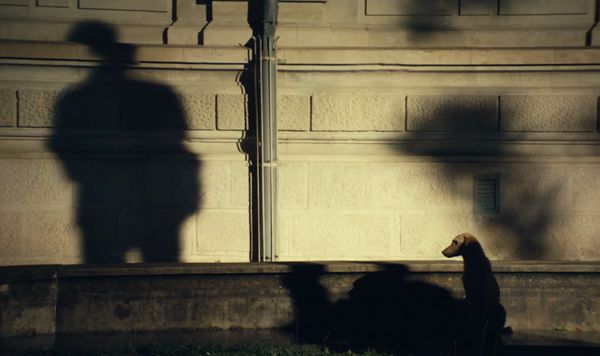 |
| What Do We See When We Look At The Sky? director Alexandre Koberidze: “When I go somewhere where there are no dogs, for example, in the streets it feels empty for me.” |
Alexandre Koberidze’s bewitching What Do We See When We Look At The Sky? (a highlight in the Main Slate of the 59th New York Film Festival) - and out in the UK now - shot by Faraz Fesharaki, with a score by Giorgi Koberidze, stars Ani Karseladze, Giorgi Bochorishvili, Oliko Barbakadze, Giorgi Ambroladze, and the man on the go Vakhtang Fanchulidze as the café owner.
 |
| Alexandre Koberidze with Anne-Katrin Titze on magical things in our everyday life: “I thought the fairy tale is a good way to think about things like this.” |
Types of folktales are difficult to pin down, as they rarely are exclusive. Even rarer, though, is a movie that encompasses almost all of the types in one. Koberidze’s magical narrative embraces the various traditions unlike any other and includes different modes of filmmaking as a bonus, without ever losing track of what is truly important and concerns us all.
The joy and concentration of kids playing together (not on phones, but the games that include running and hopping and sweating), the grace and wisdom of dogs, the cursing power of objects, the violence of our times, a towel, a tree, a river, a handful of hazelnuts, and the metamorphosis that comes with love - all find room here in the ancient town of Kutaisi.
Some moments play like silent movie slapstick, while others resemble the exquisite games and shifts of identity employed by David Lynch or Luis Buñuel. Riddles are posed, the wind and the rising river Rioni carry the sounds of a harp, or a xylophone from a music school student. The overlooked and the taken-for-granted are center stage. We get to know the enchanted meadow where cakes come from and are invited to think about how the people of the future are going to judge our actions in these “brutal and merciless times.”
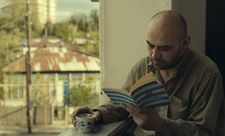 |
| Giorgi (Giorgi Bochorishvili) |
It is also the love story between Lisa and Giorgi, whose shoes we see meet first, the way Hitchcock did it in Strangers on a Train. The soothing voice of a narrator lets us in on the mystery at the crossroads: how the little seedling, the surveillance camera, and the old rain gutter explain the curse and the price to pay for love.
From New York City during the New York Film Festival, Alexandre Koberidze joined me on Zoom for an in-depth conversation on What Do We See When We Look at the Sky?
Anne-Katrin Titze: You manage to combine in your film so many folktale traditions and you weave them into one. Did you grow up with fairy tales, with folktales in general? Georgian ones and international ones?
Alexandre Koberidze: Yes, as a kid, from the beginning my father was telling me some fairy tales which he was inventing, kind of improvising. And then later my mom was reading fairy tales to me, which is usual, I think. Later my grandma started to read to me, also in an age where normally kids would read by themselves. Somehow I think I was lazy and she thought if he is not reading, I have to read this stuff which is good to know.
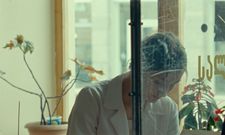 |
| Lisa (Oliko Barbakadze) |
So I started to read by myself quite late because I had that luxury. My grandma was reading many things, not only fairy tales, but stories and novels. Some years ago, when I was thinking what kinds of films I want to make generally, or for the next years, I had the idea that maybe I’m interested to think about magical, so-called magical things in our everyday life and how there’s less and less space for things like this in our world, at least in mine and around me. So I thought the fairy tale is a good way to think about things like this.
AKT: You have a wonderful way of including the magic, for instance the three objects that inform us about the curse, as the narrator tells us. They are “the little seedling” which is still in the old tradition, the second is “the surveillance camera”, replacing the evil eye, and the third “the old rain gutter.” I felt that your film points us to the overlooked, the things that we take for granted and don’t pay enough attention to. Am I right?
AK: Yes, especially about the camera. In the script it was meant to represent this evil eye. Or in the script it was that we don’t know what it is, some camera or a satellite. Something we don’t see, but it was definitely on the dark side. Then when we shot and I saw the material I understood, actually this is my reflection, but when I see this object it’s quite sweet and it has some good energy. The more I was looking at it in editing, the more it was placed in the darker side of the universe. It had something to say. I was looking at it and it was telling me, “please don’t leave me here, I’m not bad.” Somehow if you look long enough at a thing, then you start to communicate.
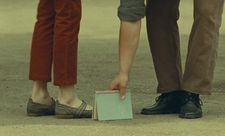 |
| Alexandre Koberidze: “For me I knew it’s the first time of these two people meeting …” |
AKT: Very true. A lot of the magic you point us to is the everyday magic. In traditional tales magic is casual and never explained and even the metamorphosis makes perfect sense. I want to talk about my favorite part of the film, which comes right after the intermission, when you take us out of the narrative. The narrator speaks of our time, the violence towards nature, human greed destroying everything, and the connection to animals. The dogs are wonderful and they deserve a film of their own.
AK: The dogs are also in my previous film. There are many dogs in Georgia generally, In Tbilisi, Kutaisi, bigger cities, everywhere. They are part of daily life. For a few years I was becoming close to them. Maybe for ten years I’ve been scared, but now we are friends and I try to spend time with them. On one hand you know that it’s a big tragedy because for every dog it’s really hard to be outside, to be alone.
On the other hand, when I go somewhere where there are no dogs, for example, in the streets it feels empty for me. I go out in Tbilisi or in Kutaisi, I know I will meet someone who will give me some warmth and we will communicate in a way which is very sincere and it’s a pure love. We love each other.
AKT: The pure love is in the way you tell the stories of the dogs wanting to see the soccer match. It’s in their faces, their movement. Did you ever see a film called KEDi about the stray cats of Istanbul?
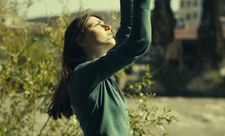 |
| Lisa (Ani Karseladze) |
AK: No.
AKT: It’s a beautiful documentary that addresses what you are saying about interactions of humans and stray animals in a city.
AK: I’ll try to find the film.
AKT: You start your film with children and there is so much positive energy watching children at play, not on their phones that is. Then comes a meeting of shoes, a bit like Hitchcock’s Strangers On A Train.
AK: It’s a huge pleasure just to film the kids. For me it’s also easier because every time, you know, with people my age or older it’s so much drama. Every human being, doesn’t matter rich or poor, lives a hard life. With kids it’s different and I also feel kind of free to film them, because they don’t have so much past, so I’m communicating with someone who is there and now. Also for me it’s about hope, because when I think about myself and my friends and how we live, we don’t know what to do about our future, it’s quite okay, we live, but it’s a bit hopeless because the world is flying apart.
AKT: Yeah.
AK: But when I see these kids, or generally, I think there will be a generation which will change the way of living. For me this is a hope, because I don’t think that I or people around me, that we will change anything. Maybe some things. But I think the next generation will manage to live differently.
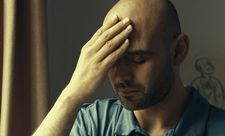 |
| Giorgi (Giorgi Bochorishvili) |
AKT: If they manage to make it. The way you show the river, yes, it’s beautiful, but it’s rising. Floods, fires, natural catastrophes come to mind. But I love what you say about the children and being so hopeful. It’s there in your shot at the end. With the shoe encounter, did you think Hitchcock?
AK: I was not thinking about Hitchcock. Now that you mention it, of course I think that’s how the images come. For me I knew it’s the first time of these two people meeting and we are saying there that they fall in love in this moment, at least this falling in love starts there. There are two things: One, I think it’s the most private moment of two people, so I don’t want to look in their faces. So I thought, let’s leave this moment.
AKT: Privacy.
AK: Also, if not privacy, I don’t know how people look or what their faces do or how they react in this very moment of falling in love. I think you can’t play it, you can’t show it. But I can imagine that some big painter in the Renaissance would have painted something like this, but for me it’s too risky to do it. I wouldn’t know how to do it.
AKT: Thank you so much for this very full, beautiful film!
AK: Thank you for your time and for the interesting talk. It was very interesting for me.
Read what Alexandre Koberidze told us about composer Giorgi Koberidze, the enchantment of the harp, silent movies, Vakhtang Fanchulidze, the screenplay, framing the film, the past and into the future.
New York Film Festival Deep Focus conversation with Alexandre Koberidze and Silvan Zürcher (The Girl And The Spider) was held on Saturday, October 2, 7:00pm inside the Amphitheater at Lincoln Center.
What Do We See When We Look At The Sky? is out on release in the UK now





















